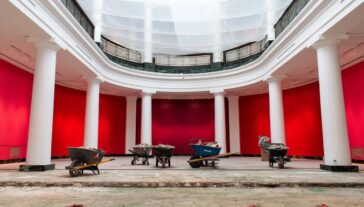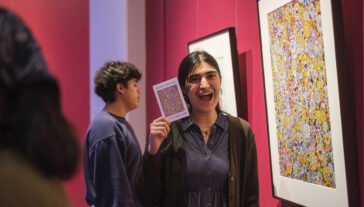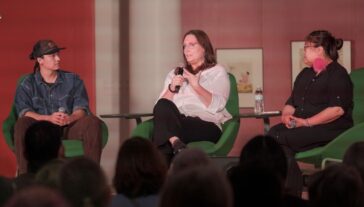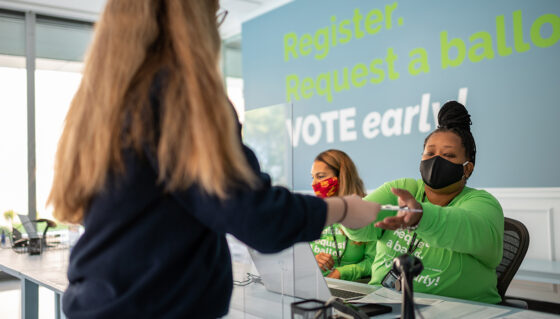America’s Political Divide, Midterm elections take center stage at UMMA this fall with several artist-driven projects
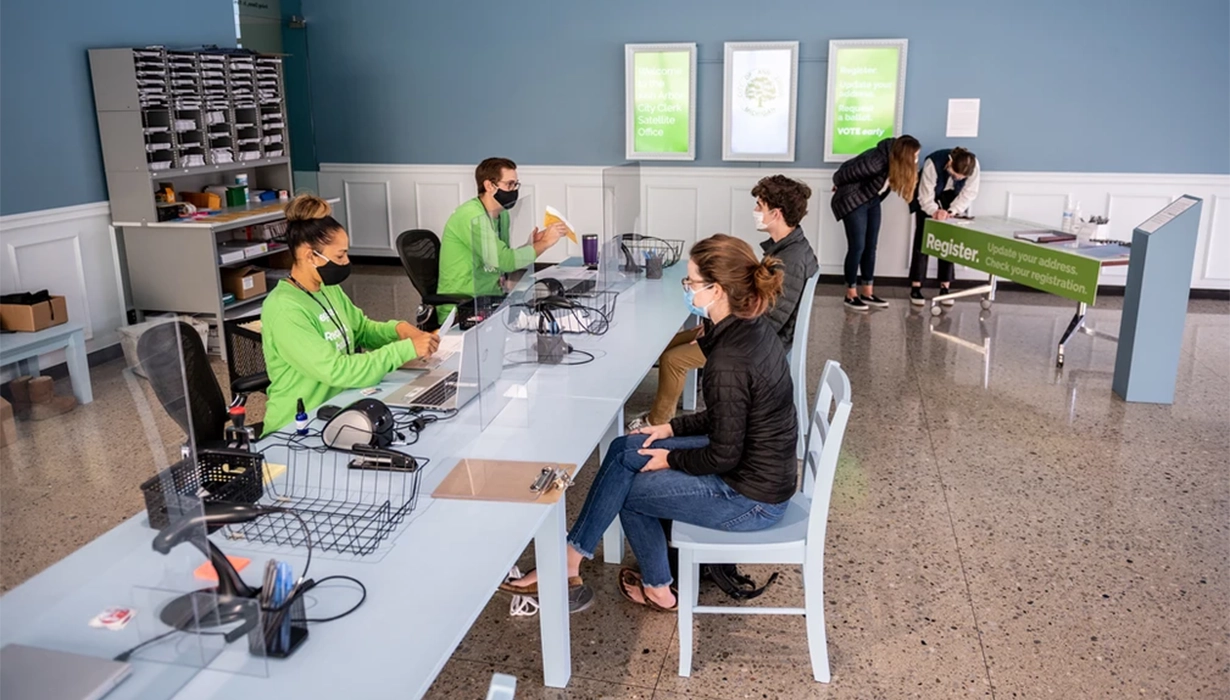
Creative Campus Voting Project Installation Will Transform Gallery Space into Voting Hub
Social Practice Artist Philippa Pham Hughes to Host Events Encouraging Dialogue and Healing Across The Political Spectrum
This fall, the University of Michigan Museum of Art (UMMA) will launch a wide-ranging program to engage the public with the upcoming midterm elections, expanding its commitment to civic responsibility and enhancing the museum’s role in its community. The program, called Vote 2022: Midterms Matter, features partnerships with the City of Ann Arbor, the non-partisan Creative Campus Voting Project (CCVP), and Washington, D.C.-based social practice artist Philippa Pham Hughes that are envisioned to demystify the voting process, energize voters, and encourage meaningful public dialogue in the lead up to election day.
At the core of the program is the transformation of UMMA’s most visible and highly trafficked spaces into a satellite location of the Ann Arbor City Clerk’s Office, where Ann Arbor residents, including University of Michigan students who live in Ann Arbor, will be able to register to vote, obtain absentee ballots, complete ballots on site if they wish, and return their absentee ballots to an official City of Ann Arbor dropbox. The satellite location at UMMA is being designed by the CCVP, which is led by Stephanie Rowden and Hannah Smotrich, faculty members at the University’s Stamps School of Art and Design, to encourage an accessible and welcoming voting experience. The Ann Arbor City Clerk’s Satellite Office at UMMA will be open from September 27 through November 8, 2022, with hours available on the museum’s website.
UMMA is also collaborating with artist Philippa Pham Hughes to develop programs to foster dialogue among individuals across the political spectrum and begin to heal some of the divisions plaguing our society. In particular, on November 3, Hughes will host a dinner and conversation event for approximately 120 people that focuses on the question: “What does it mean to be an American right now?”. The event, titled Hey, We Need to Talk, is inspired by a longstanding series created by Hughes to encourage people to talk to each other and overcome our profound sense of polarization. Participants for the event will be selected by both invitation and open application, which is currently available on UMMA’s website, to ensure that guests represent a broad cross-section of political perspectives. Throughout the evening, Hughes will facilitate the conversation to build personal connections among participants, allowing for the possibility of more challenging, politically-oriented discussion later in the night. The approach recognizes that people who feel personal commonality are more likely to have productive dialogue about difficult subjects.
“It’s not enough to say that museums are vital to our society. Museums have to create new pathways for engaging and serving their communities, especially in critical moments of change,” said Christina Olsen, UMMA’s director. “With our Vote 2022 initiative, we are fulfilling an essential public need, and doing so in ways that leverage the assets of a major research university and the deep capacity of artists to make ideas more legible and bring people together. The effort reflects UMMA’s commitment to its civic and cultural power. We believe museums have important roles to play in their communities that extend well beyond traditional presentations of art.”
MORE ABOUT THE CCVP INSTALLATION
In addition to the satellite city clerk’s office, CCVP is designing areas across the Museum’s first floor where voters can find resources about the voting process and connect with peer mentors. The effort follows the success of UMMA’s 2020 partnership with CCVP and the City of Ann Arbor for the presidential election, during which 5,400 people were registered to vote and more than 8,000 ballots were collected at UMMA.
CCVP was founded in 2018 by Rowden and Smotrich, who saw an opportunity to leverage the power of art and design to educate and energize voters. “We work at the intersection of public art and civic design,” said Rowden. “Information overload and confusion are real barriers for new voters. Everything we do is aimed at fostering a clear, welcoming, and delightful voting experience, particularly for first-time and student voters.”
For example, large graphics visible from outside the museum provide a high-level outline of why midterms matter, signage at the ballot dropbox prompts a quick double check to avoid common errors, and a giant button mural offers a celebratory photo op.
Informed by insights from behavioral science, CCVP designed each aspect of the installation at UMMA, which is titled Register. Request a Ballot. Vote Early!, to demystify the process and reduce anxiety for student voters. Smotrich added, “we think carefully about what information new voters might need at each phase of the process, and importantly, how best to deliver it—whether a well-placed sign, a floor graphic, or a friendly interaction with one of the peer mentors in the UMICH Votes Fellows cohort.”
CCVP is a non-partisan research initiative that reimagines the role of art and design in civic participation. They began with the idea that, as art and design faculty, their creative toolbox could help address the challenges faced by student voters. They use their skills in narrative and visual design to develop inviting spaces, experiences, and materials that empower peer-to-peer learning, and prompt action.
MORE ABOUT THE COLLABORATION WITH ARTIST PHILIPPA PHAM HUGHES
Philippa Pham Hughes is a social practice artist, who creates “social sculptures” that invite people to engage in conversations across political, social, and cultural differences. In 2016, following the election of former president Donald Trump, Hughes began organizing dinners with Trump supporters to better understand America’s seemingly growing political and social divides. The dinners proved both insightful and healing for participants and Hughes’ effort quickly grew into a national tour, titled Looking for America, supported by the advocacy organization New American Economy. Since 2016, Hughes has hosted more than a dozen dinners in locations across the country, including Anchorage, El Paso, Salt Lake City, and Washington D.C.
“Americans are exhausted by polarization. I have witnessed firsthand diverse people across this country eager to break bread with each other and heal the divide,” Hughes said. “I have seen that when we push through the discomfort of talking to people who we think are so different from us, we actually find that we have a lot more in common than we have been led to believe. We have been torn apart by external forces bent on gaining power and profit by keeping us apart. I call it the Polarization Industrial Complex and we can all fight back together. The events I organize are part of this effort to bring us together and inspire meaningful dialogue.”
The forthcoming November 3 event Hey, We Need to Talk at UMMA is part of Hughes’ broader body of work and is grounded in research about political polarization and social cohesion. The event is envisioned to bring people out of their existing social bubbles and the echo chambers of social media to have face-to-face conversations about subjects of both personal and political meaning. While the event will feature up to 120 guests, discussions will be held in smaller table groups to support intimacy within the dialogues. All of the conversations will be guided by Hughes and facilitators trained by Hughes to build curiosity, openness, and connection among the guests, which provides the platform to engage in sensitive political discussions as the evening progresses.
“You cannot simply put people in the same room and instruct them to have conversations. To really move people toward empathy, we must create an environment for personal interaction that inspires curiosity,” added Hughes.
In addition to the Hey, We Need to Talk event, Hughes is collaborating with UMMA to support the creation of several interactive installations by Michigan-based artists. Each installation will engage with issues of political and social importance and be presented on October 14, during one of UMMA’s late-night evenings, titled Feel Good Friday.
More from UMMA
